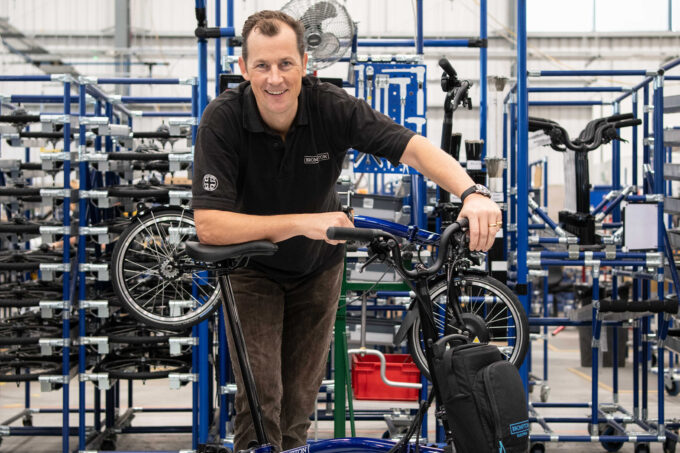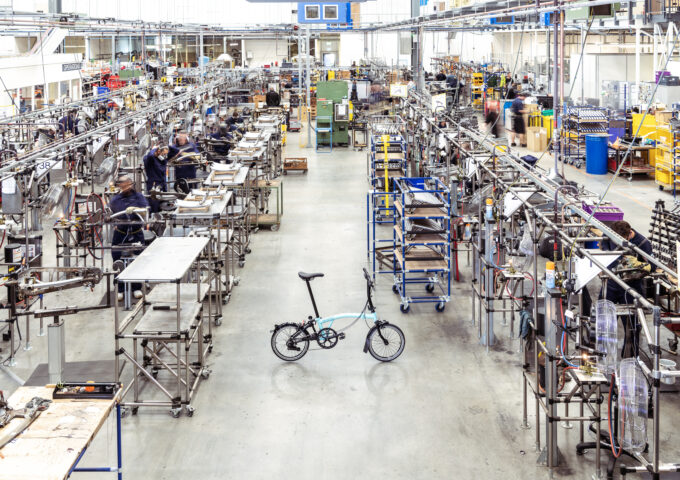
Digital sustainability: it pays to be a leader, not a laggard
Companies that excel in both digital and sustainable transformation attract a stock market premium, according to research. So, how do you tap into that value? ...

by Will Butler-Adams Published 13 April 2023 in Competitiveness • 8 min read
No plan survives first contact with the enemy, or so the military maxim goes. The same is increasingly true in business. If the past three years of turmoil have taught us leaders anything, it’s that business success isn’t necessarily about having a fantastic plan: it’s about how you respond when things don’t go according to plan.
Facing the combined threat of economic pressures and geopolitical tensions, what counts today is your ability to set up a business that may have marginally greater costs yet is able to respond very quickly to things that you didn’t anticipate, like a pandemic, a war, or Brexit.
I’ve been writing business plans for 20 years at Brompton, and I can tell you that we have never once delivered what we planned to. But pressure on the business has intensified since the UK’s departure from the EU in 2020, with some parts being held up at ports and disruption to our exports, too.
Pressure on Brompton has continued in the years since, with a temporary drop in production and fall in demand for bikes during the first pandemic lockdown. The war in Ukraine also drove up the cost of metals, and geopolitical tensions in Asia have led us to explore diversification of our supply chain.
These inflationary and supply chain shocks have led to a short-term drop in profitability, even as our revenue rose on the back of higher sales. But I take the longer-term view. What matters more than anything is the ability to respond quickly to threats when they emerge. This is how you build a business to last, not just a business that can make a quick buck.
Planning is how you set the strategic direction for the company, but even the best-laid plans can go awry. Consider that in January last year, we launched the UK’s first titanium-fold up bicycle to capitalize on a pandemic-driven boom in cycling. But only weeks later, Russia invaded Ukraine, restricting supply of the lightweight metal out of these two countries. That drove up prices for raw materials and, combined with rising labor costs, that has eaten into our profit margin, even as we sold a third more bikes last year than in 2021.
The point is that strategic planning will give everybody a sense of where you are trying to get to as a business, but the path will change. To reach that end destination, you may have to go off the beaten track. And the way to instill that flexibility is to build what I call an “autonomous business” with decentralized control, where the decision-making power is delegated to trusted employees.

It may sound risky or uncomfortable to let go of the reins, but this approach has increased Brompton’s agility and flexibility. And it was evident in the early stages of the pandemic, when lockdowns forced 600 stores across Europe that stocked our bikes to close. The situation was so dire that I thought we might go bust, but I empowered our 750 employees to find a way for Brompton to ride out of the abyss.
They started selling bikes directly to consumers during lockdown, creating an e-commerce business rapidly in just a few months. And they did it without my direct involvement. Frankly, I haven’t got a clue about e-commerce, but they pulled it off. We sold about 10,000 more bikes made in London during the 2020 financial year compared with 2019. Pre-tax profits soared by two-thirds to £6 million, thanks to a surge in new riders during the pandemic. This was also helped by a £1 million stockpile of parts built up ahead of Brexit, as we prepared for Britain crashing out of the EU without a deal.
By contrast, companies with centralized power can grind to a halt when they get blown off course by unexpected events. People wait around to be told what to do. It’s also fairly soul destroying for people not to have autonomy in their work. Our staff want to be the ones solving the problems, not just identifying them. So, as business leaders we need to let go, so that others may shine.
The starting point is communicating a clear, unified ambition to everyone in the business. As long as everyone knows which mountain we are climbing, you can relax, safe in the knowledge that they will keep striving for the summit. Trust can also be built through transparency. We make our accounts available for staff to read so they can see our financials, warts and all. Everyone in the company knows how much I earn. If you can trust your people, they will repay it in kind.

1975
Andrew Ritchie was a young engineer who believed in a better way to move around the city. In the bedroom of his flat overlooking the Brompton Oratory, he invented a bike with an ingenious three three-part fold: a vehicle that transformed into a small package and could go anywhere. Over the next decade, Ritchie obsessively honed his invention. He worked in a small rented workshop at a local engineering company and made each bike to order.
After years struggling to find financial backing, Julian Vereker, a Brompton owner and founder of Naim Audio, steps in to help. The Brompton folding bike wins the coveted Best Product Award at the Cyclex Bike Show in London. Bikes are built at the rate of 60 a month at the first Brompton factory – housed inside two old railway arches in Brentford, Middlesex.
Brompton grows to 56 outlets in the UK with an even bigger export market.
Launch of the Brompton Superlight model. Engineered with a lightweight titanium rear frame and forks, it represents an evolution for both bicycle and company.
Will Butler-Adams is appointed Managing Director. Ritchie, now Technical Director, focuses on engineering. Brompton is chosen to represent London in the closing stages of the Olympic Games in Beijing.
The first Brompton Junction store opens in Kobe, Japan – a space where existing owners and the simply curious could take a test ride and receive specialist advice. Today, there are 16 stores in cities across the world.
First Brompton e-bike goes on sale – an idea first outlined in Ritchie’s original patent.
The second point is that people must be empowered to take risks without fear of failure. That starts at the top. At Brompton, I’m not ashamed to admit that the biggest catastrophe is me. At times, I have been an unmitigated disaster, rolling from one screwup to the next. That may seem like a frank admission, but if you are not transparent and honest about your faults, then no one else is going to have the confidence to go out on a limb and take a risk.
As long as they’re not betting the farm, employees should have the confidence to fess up to making a mistake. Because most people make gaffes when they are trying their hardest. So if someone is not messing up, they’re not the right employee for Brompton.
The third and final point is that you need to find ways to de-risk your business. When I joined Brompton in 2002, there were only eight people who could braze metal with a torch, joining two bits of steel together to build the bicycle frames. If two are on holiday and two are sick, that means our production output is down by half. So, we were very vulnerable in that area – a risk that I dealt with through staffing, improved training, and more automation.
As any business grows those points of vulnerability are constantly shifting, so you need to be on the lookout for ways to shore them up. One example is the supply chain. Concentrating production in one location leaves you exposed to disruptions, such as the lockdowns we have seen across the world in recent years. That is why we are working to diversify our supply chain so we are not reliant on one supplier or one region.
We will still continue to source from existing suppliers, but in a more uncertain world we cannot place all our eggs in one basket. If we are to navigate this world successfully, it’s the flexibility that counts.

CEO of Brompton Bicycles
CEO of Brompton, an independent UK-based bicycle manufacturing company with more than 750 workers. He joined the company in 2002, aged 28, when it had around 40 employees. Since then, Brompton has become a global brand with over a million customers and turnover has increased from £2m to £100m.

17 July 2024 • by Michael R. Wade, Evangelos Syrigos in Competitiveness
Companies that excel in both digital and sustainable transformation attract a stock market premium, according to research. So, how do you tap into that value? ...

8 July 2024 • by Richard Baldwin in Competitiveness
As the world’s largest democracy prepares to overtake China in terms of economic growth, it offers a huge investment opportunity, explains IMD’s Richard Baldwin....

26 June 2024 • by Arturo Bris in Competitiveness
Don’t be deterred by doom-laden narratives. To create societies that are prosperous and inclusive, it’s time for leaders to focus on facts and future readiness, says Arturo Bris...

14 June 2024 • by Howard H. Yu in Competitiveness
This weekend’s G7 summit will see renewed calls for protectionist measures against Chinese EV manufacturers. But tariffs would be misguided and universally damaging, warns IMD’s Howard Yu ...
Explore first person business intelligence from top minds curated for a global executive audience